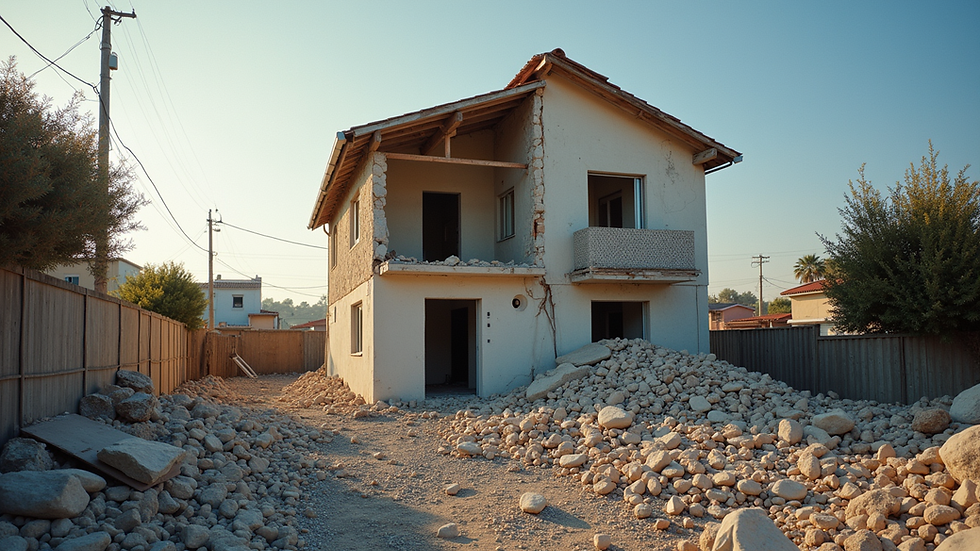12 Ways to Insure Your Home for Less
- Doron Yaniv
- Jul 27, 2018
- 4 min read

STOP SMOKING
The U.S. Fire Administration estimates there are about 7,600 smoking-related fires in the United States each year and notes that smoking is the leading cause of home fire deaths. Being a nonsmoker or stopping the habit means decreased premiums for homeowner's, health, and life insurance.
RENOVATIONS
Insurance premiums can rise depending on the age of your home, but you can help ward off an increase by investing in renovations. A new roof, foundation, plumbing, or electrical wiring can each lower your insurance rate. Be mindful of the renovation materials; using fire-resistant siding or shingles makes a difference.
STORE VALUABLES OUT OF THE HOUSE
There is an additional risk when you keep high-priced jewelry, artwork, and other valuables at home. Storing these items in a safe deposit box at a bank can help reduce premiums. If you want to leave them out in the open -- artwork, say -- and happen to own a business, display the pieces at the office and insure them there. Ask your financial advisor if this counts as a business expense.
SHOP BEFORE YOU BUY
Each insurance company has its own way of pricing insurance and its own set of costs. Once you determine the amount of coverage you need, shop around for the cheapest rate and be sure to check customer reviews before signing on. Also check the fine print for exclusions or special rules; some companies may not cover pet-related incidents, for example, or may require that you fence in your pool before writing up a policy.
STICK WITH A SINGLE PROVIDER
Buying multiple insurance products from a single provider is an easy way to get a discount. If you already pay for life or auto insurance with a provider get a quote for homeowner policy as well. Sticking with one provider can earn you some loyalty points and companies may reduce premiums by 5 or 10 percent for long-term clients. This is not an excuse to be lazy -- periodically shop around for the best rates for the coverage you want.
BEEF UP SECURITY
If you take steps to keep your home and personal property safe, you'll be rewarded with lower premiums. A fence, security system, water shut-off valve, and a safe for expensive jewelry or other valuables can be worthwhile investments.
RETHINK THE HOME OFFICE
The extra office supplies and equipment in a home office lead to larger losses during a burglary or fire and more potential for accidents -- and thus, higher premiums. Given all the advantages of having a home office, it may not be worth the cost and hassle to rent office space elsewhere, so consider covering that room with a separate insurance policy and enjoy a tax benefit.
HAZARDS INCREASE RATES
The insurance company knows that if you have a trampoline, tree-house, or swimming pool, accidents are more likely, and rates go up accordingly. You may be willing to part with the trampoline, but if your family pet is burdened with a dubious reputation (think Rottweiler or pit-bull), parting with the animal in the quest for lower premiums probably isn't an option. Consider the consequences before introducing insurance hazards to your home.
LOWER YOUR LIMITS
As with most insurance, if you decrease the amount of coverage in your homeowners' policy, premium costs drop as well. That seems pretty straightforward, but the one complication about homeowner's insurance is how the property is valued. You've paid for the land, your home, and personal belongings -- each worth something. However, in the event of a major disaster, such as a fire or flood, it is unlikely that the land will be destroyed. Keep this in mind when assessing how much coverage you want. Insurance agents have home-replacement cost calculators that can help guide your decision.
RAISE YOUR DEDUCTIBLE
Just like lowering your overall coverage can decrease premium rates, raising the deductible -- the amount you must pay out of pocket before the insurance kicks in -- has the same effect. If you want insurance only to protect against extreme contingencies, raising the deductible may be acceptable. However, if you want coverage for small claims or situations like off-premises theft, think long and hard before lowering the deductible and be prepared to pay up if you do.
RAISE YOUR CREDIT SCORE
If you expect to buy homeowners insurance in the near future or are considering switching providers, take some time to understand how your credit score is calculated and how you can raise it. Higher scores can lead to lower premiums, and simple actions such as applying for a new credit card can temporarily decrease your score. To increase your credit score try to use only 10 to 20 percent of your total available revolving credit and avoid holding a balance, if you can.
RECONSIDER MAKING A CLAIM
You buy insurance to protect you financially when something happens, but filing a claim is not always worth it. If someone steals your $700 television, but you have a $500 deductible, the $200 insurance payout might be less than what you'll pay in increased premiums at renewal time. Providers often offer premium discounts for being claims-free for multiple years.
.png)



Comments